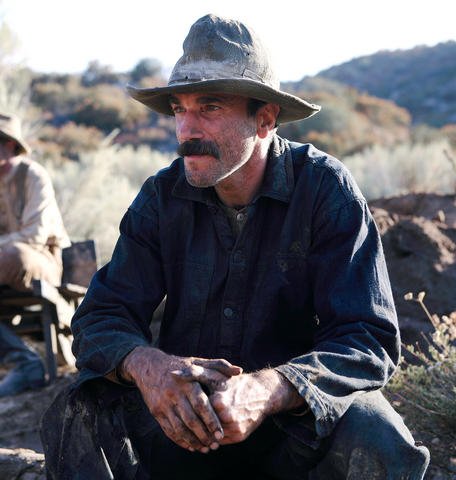There Will Be Blood, Paul Thomas Anderson's epic American nightmare, arrives belching fire and brimstone and damnation to Hell. Set against the backdrop of the Southern California oil boom of the late-19th and early-20th centuries, it tells a story of greed and envy of biblical proportions - reverberating with Old Testament sound and fury and New Testament evangelicalism - which Anderson has mined from Upton Sinclair's 1927 novel Oil! There is no God but money in this oil-rich desert and his messenger is Daniel Plainview, a petroleum speculator played by a monstrous and shattering Daniel Day-Lewis.
Plainview is an American primitive. He's more articulate and civilized than the crude, brutal title character in Frank Norris' 1899 novel McTeague, and Erich von Stroheim's masterly version of the same, Greed. But the two characters are brothers under the hide, coarse and animalistic, sentimental in matters of love and ruthless in matters of avarice. Anderson opens his story in 1898, closer to Norris' novel than Sinclair's, which begins in the years leading up to World War I. And the film's opener is a stunner - spooky and strange, blanketed in shadows and nearly wordless. Inside a deep, dark hole, a man pickaxes the hard-packed soil like a bug gnawing through dirt. This is the earth mover, the ground shaker: Plainview.
Over the next two and a half mesmerizing hours Plainview will strike oil, then strike it rich and transform a bootstrapper's dream into a terrifying prophecy about the coming American century. It's a century he plunges into slicked in oil, dabbed with blood and accompanied by H.W. (eventually played by the newcomer Dillon Freasier), the child who enters his life in 1902 after he makes his first strike and seems to have burbled from the ground like the liquid itself. The brief scenes of Plainview's first tender, awkward moments with H.W. will haunt the story. In one of the most quietly lovely images in a film of boisterous beauty, he gazes at the tiny, pale toddler, chucking him under the chin as they sit on a train very much alone.

PHOTO: COURTESY OF PARAMOUNT VANTAGE
There Will Be Blood involves a tangle of relationships, mainly intersecting sets of fathers and sons and pairs of brothers. (Like most of the finest American directors working now, Anderson makes little onscreen time for women.) But it's Plainview's intense, needful bond with H.W. that raises the stakes and gives enormous emotional force to this expansively imagined period story with its pictorial and historical sweep, its raging fires, geysers of oil and inevitable blood. (Rarely has a film's title seemed so ominous.) By the time H.W. is about 10, he has become a kind of partner to his father, at once a child and a sober little man with a jacket and neatly combed hair who dutifully stands by Plainview's side as quiet as his conscience.
A large swath of the story takes place in 1911, by which point Plainview has become a successful oilman with his own fast-growing company. Flanked by the watchful H.W., he storms through California, sniffing out prospects and trying to persuade frenzied men and women to lease their land for drilling. One day a gangling, unsmiling young man, Paul Sunday (Paul Dano), arrives with news that oil is seeping out of the ground at his family's ranch. The stranger sells this information to Plainview, who promptly sets off with H.W. to a stretch of California desert where oil puddles the ground among the cactus, scrub and human misery.
Not long afterward oil is gushing out of that desert. The eruption rattles both the earth and the local population, whom Plainview soothes with promises. Poor, isolated, thirsting for water (they don't have enough even to grow wheat), the dazed inhabitants gaze at the oilman like hungry baby birds. He promises schools, roads and water, delivering his sermon with a carefully enunciated, sepulchral voice that Day-Lewis seems to have largely borrowed from the director John Huston. Plainview is preaching a new gospel, though one soon challenged by another salesman, Paul Sunday's Holy Roller brother, Eli (also Dano). A charismatic preacher looking to build a new church, Eli slithers into the story, one more snake in the desert.
Anderson has always worn his influences openly, cribbing from Martin Scorsese and Robert Altman among others (he helped the ailing Altman with his final film, A Prairie Home Companion), but rarely has his movie love been as organically integrated into his work as it is here. Movie history weighs on every filmmaker, informs every cut, camera angle and movement. There Will Be Blood is very much a personal endeavor for Anderson; it feels like an act of possession. Yet it is also directly engaged with our cinematically constructed history, specifically with films like Citizen Kane that have dismantled the mythologies of American success and, in doing so, replaced one utopian ideal for another, namely that of the movies themselves.
This is Anderson's fifth feature and it proves a breakthrough for him as a filmmaker. Although there are more differences than similarities between it and the Sinclair book, the novel has provided him with something he has lacked in the past, a great theme. It may also help explain the new film's narrative coherence. His first feature, Sydney (also known as Hard Eight), showed Anderson to be an intuitively gifted filmmaker, someone who was born to make images with a camera. His subsequent features - Boogie Nights, Punch-Drunk Love - have ambition and flair, though to increasingly diminished ends. Elliptical, self-conscious, at times multi-threaded, they contain passages of clarity and brilliance. But in their escalating stylization you feel the burdens of virtuosity, originality, independence.
The movie exhibits much the same qualities as Anderson's previous work - every shot seems exactly right - but its narrative form is more classical and less weighted down by the pressures of self-aware auteurism. It flows linearly, building momentum and unbearable tension. Day-Lewis' outsize performance, with its footnote references to Huston and strange, contorted Kabuki-like grimaces, occasionally breaks the skin of the film's surface like a dangerous undertow. It's a thrilling performance, purposefully alienating and brilliantly located between cinematic realism and theatrical spectacle.
This tension between realism and spectacle runs like a fissure through the film and invests it with tremendous unease. You are constantly being pulled away from and toward the charismatic Plainview, whose pursuit of oil reads like a chapter from this nation's grand narrative of discovery and conquest. His 1911 strike puts the contradictions of this story into graphic, visual terms.
With a story of and for our times, There Will Be Blood can certainly be viewed through the smeary window that looks onto the larger world. It's timeless and topical, general and specific, abstract and as plain as the name of its fiery oilman. It's an origin story of sorts. The opening images of desert hills and a droning electronic chord allude to the beginning of 2001: A Space Odyssey, whose murderous apes are part of a Darwinian continuum with Daniel Plainview. But the film is above all a consummate work of art, one that transcends the historically fraught context of its making, and its pleasures are unapologetically aesthetic. It reveals, excites, disturbs, provokes, but the window it opens is to human consciousness itself.

From the last quarter of 2001, research shows that real housing prices nearly tripled (before a 2012 law to enforce housing price registration, researchers tracked a few large real estate firms to estimate housing price behavior). Incomes have not kept pace, though this has not yet led to defaults. Instead, an increasing chunk of household income goes to mortgage payments. This suggests that even if incomes grow, the mortgage squeeze will still make voters feel like their paychecks won’t stretch to cover expenses. The housing price rises in the last two decades are now driving higher rents. The rental market

July 21 to July 27 If the “Taiwan Independence Association” (TIA) incident had happened four years earlier, it probably wouldn’t have caused much of an uproar. But the arrest of four young suspected independence activists in the early hours of May 9, 1991, sparked outrage, with many denouncing it as a return to the White Terror — a time when anyone could be detained for suspected seditious activity. Not only had martial law been lifted in 1987, just days earlier on May 1, the government had abolished the Temporary Provisions Effective During the Period of National Mobilization for Suppression of the Communist

Fifty-five years ago, a .25-caliber Beretta fired in the revolving door of New York’s Plaza Hotel set Taiwan on an unexpected path to democracy. As Chinese military incursions intensify today, a new documentary, When the Spring Rain Falls (春雨424), revisits that 1970 assassination attempt on then-vice premier Chiang Ching-kuo (蔣經國). Director Sylvia Feng (馮賢賢) raises the question Taiwan faces under existential threat: “How do we safeguard our fragile democracy and precious freedom?” ASSASSINATION After its retreat to Taiwan in 1949, the Chinese Nationalist Party (KMT) regime under Chiang Kai-shek (蔣介石) imposed a ruthless military rule, crushing democratic aspirations and kidnapping dissidents from

Fundamentally, this Saturday’s recall vote on 24 Chinese Nationalist Party (KMT) lawmakers is a democratic battle of wills between hardcore supporters of Taiwan sovereignty and the KMT incumbents’ core supporters. The recall campaigners have a key asset: clarity of purpose. Stripped to the core, their mission is to defend Taiwan’s sovereignty and democracy from the Chinese Communist Party (CCP). They understand a basic truth, the CCP is — in their own words — at war with Taiwan and Western democracies. Their “unrestricted warfare” campaign to undermine and destroy Taiwan from within is explicit, while simultaneously conducting rehearsals almost daily for invasion,